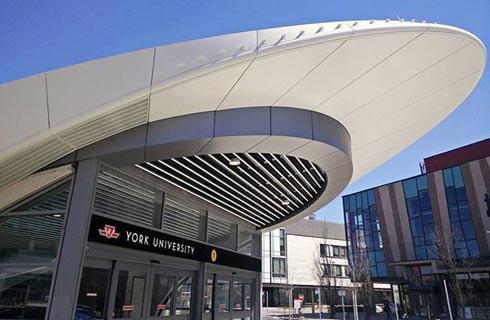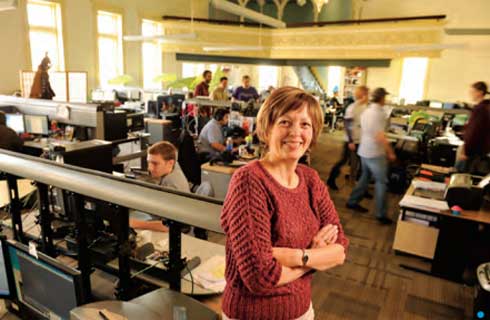Master of Science in Materials Science and Engineering - Metallurgy and Corrosion

学历文凭
Masters Degree

专业院系
材料科学

开学时间

课程时长

课程学费

国际学生入学条件
For admission to graduate study, an applicant must have a U.S. bachelor's degree or the equivalent of a U.S. bachelor's degree prior to enrollment.
Transcripts and Degrees must be in English (all post-secondary education, including transcript keys).
Unofficial transcripts should be uploaded to your graduate application. The minimum requirement for admission consideration is the completion and award of a four year U.S. bachelor's degree, or its equivalent, by the time of planned enrollment.
Personal Statement
Resume or curriculum vitae
Two letters of recommendation
Portfolio, if required by department
TOEFL score of 88 iBT
IELTS score of 6.5
Transcripts and Degrees must be in English (all post-secondary education, including transcript keys).
Unofficial transcripts should be uploaded to your graduate application. The minimum requirement for admission consideration is the completion and award of a four year U.S. bachelor's degree, or its equivalent, by the time of planned enrollment.
Personal Statement
Resume or curriculum vitae
Two letters of recommendation
Portfolio, if required by department
TOEFL score of 88 iBT
IELTS score of 6.5
IDP—雅思考试联合主办方

雅思考试总分
6.5
了解更多
- 雅思总分:6.5
- 托福网考总分:88
- 托福笔试总分:160
- 其他语言考试:Duolingo score of 120<br>PTE score of 59
CRICOS代码:
申请截止日期:请 与IDP联系 以获取详细信息。
课程简介
Metallurgical research at Rensselaer spans development and processing of advanced alloys for structural and aerospace applications, to interconnects and contacts for electronic technologies, in addition to fundamental studies of their degradation and corrosion mechanisms. This research combines strengths in advanced characterization techniques and predictive computational simulations to uncover the dependence of microstructure on composition, growth and processing techniques, its effect on mechanical properties and chemical stability, as well as to actively control it to target desired properties.<br><br>Engineering microstructures of metals and alloys depends critically on quantitative understanding of nucleation and solidification. This involves experimental characterization of microstructure, mechanical, thermal and electrical properties using electron microscopy, differential thermal analysis, electrodeposition and directional solidification studies, coupled closely with computational modeling using phase field methods. Present focus areas for microstructural design include aluminum alloys for mechanical properties, and lead-free solders such as Sn-Ag-Cu alloys for electrical contacts.<br><br>Chemical stability, corrosion and degradation are key concerns for metallic materials, which become increasingly important at reduced nanoscale dimensions in new technologies. Advanced characterization tools such as in situ electron microscopy combined with electrochemical measurements enable investigation of fundamental nanoscale mechanisms of corrosion of materials and solid-state electrode degradation in batteries. Corrosion research at Rensselaer also extends beyond metals to ferroelectric materials under extreme conditions of low pH, high pressures, and high temperatures for applications in oil and gas exploration.
相关申请

预科

奖学金

实习机会

在校学习

跨境学习

校园授课-线上开始

在线/远程学习
学校排名
世界排名
351
数据源:泰晤士高等教育世界大学排名
本校相关课程
电气工程学学士学位

学历文凭
Bachelor Degree
下一个开始日期
课程费用总额
Bachelor of Science in Interdisciplinary Science

学历文凭
Bachelor Degree
下一个开始日期
课程费用总额
Bachelor of Science in Physician-Scientist/Doctor of Medicine

学历文凭
Combined Bachelor's / Doctoral Degree
下一个开始日期
课程费用总额
技术商业化和创业学理学硕士

学历文凭
Masters Degree
下一个开始日期
课程费用总额
科学技术哲学博士

学历文凭
Ph.D.
下一个开始日期
课程费用总额
物理学哲学博士

学历文凭
Ph.D.
下一个开始日期
课程费用总额
其他相关课程
工程哲学博士-材料科学与工程(博士学位,可选)

麦克马斯特大学
泰晤士高等教育世界大学排名:

学历文凭
Ph.D.
下一个开始日期
课程费用总额
Master of Science in Materials Science

安大略理工大学
泰晤士高等教育世界大学排名:915

学历文凭
Masters Degree
下一个开始日期
课程费用总额
Master of Science in Materials Science and Engineering

克莱姆森大学
泰晤士高等教育世界大学排名:

学历文凭
Masters Degree
下一个开始日期
课程费用总额
材料科学哲学博士

南加州大学
泰晤士高等教育世界大学排名:74

学历文凭
Ph.D.
下一个开始日期
课程费用总额
材料科学理学硕士

南加州大学
泰晤士高等教育世界大学排名:74

学历文凭
Masters Degree
下一个开始日期
课程费用总额
Doctor of Philosophy in Materials Science and Engineering

北德克萨斯大学
泰晤士高等教育世界大学排名:

学历文凭
Ph.D.
下一个开始日期
课程费用总额




